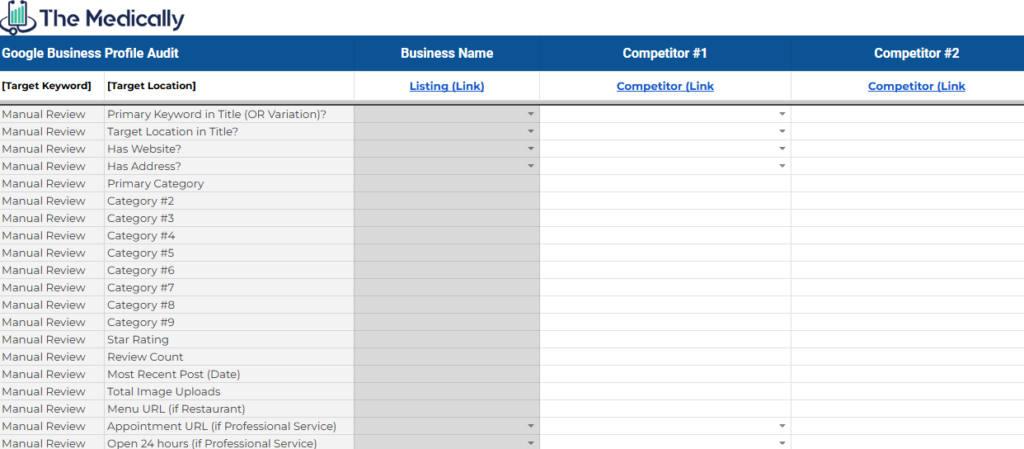MEDICAL SEO:
The Definitive Guide to Healthcare SEO
Find out how you can unlock unlimited online leads for your medical website. In this medical SEO guide you’ll learn all about:
- Healthcare SEO basics (what it is and how it can help you)
- Market research and strategy
- Medical content research and writing strategy
- Technical SEO insights to boost your rankings
Ready to start? Let’s go!

WHAT YOU WILL LEARN
Contents
CHAPTER 1:
Medical SEO Basics
You’ll find out exactly what is healthcare SEO, what are its benefits and how do Search Engines work to rank your pages:

What Is Medical SEO?
Medical SEO (Search Engine Optimization) is the process of improving the visibility and ranking of a healthcare website or webpage in search engine results pages (SERPs) for relevant medical keywords and phrases.
It involves optimizing various aspects of the website, such as content, technical structure, and backlinks, to make it more appealing to search engines like Google.
In plain English now ..
Say you are an Orthodontist who owns a practice in New York City.
How does medical / dental SEO work for you?
We’ll use this as the main example throughout our guide. Of course, the same principles apply if you are a Chiropractor in San Jose or an OBGYN in Los Angeles.
You can use this guide for your own DIY SEO work (nothing wrong with rolling up your sleeves and doing some marketing) or to understand the exact process that gets your practice new leads. If you’ll choose to use our medical SEO services (or another company’s), at least you’ll understand the ranking process and what needs to be done.
Back to our issue at hand.
You are a NYC based Orthodontist who’d want to get more patient bookings. How will a medical SEO make this happen?
In our unfriendly definition above, we used words like: ranking, keywords, SERPs etc. They are all a part in the very complex process of optimizing a medical website.
When people are searching for “new york orthodontist” for instance, you’ll want to rank in the top of the search results:
Local Pack (Map Pack)
This happens thanks to optimizing your practice’s Google Business Profile. Your GBP is separate from your medical website, but it needs extra-attention as well, in order to rank.
If you have a physical office, you will want to dominate the map pack, because this alone will get you a lot of patient bookings. Known as Google My Business (GMB) years ago, Google Business Profiles are a great way to get leads, even if your website is not yet ranking too well.

Organic Results
Together with the GBP, you’ll need to work on your medical website. Create compelling content, secure backlinks, constantly provide useful updates to your visitors.
In time, your website will appear high in the SERPs for your chosen keywords, thus allowing you to generate quality leads.

Why do I keep mentioning “quality leads”?
If your website’s visitor is looking for “invisalign new york“, “orthodontist nyc“, it’s clearly a very targeted lead. When your blog posts are going to rank for “how much does it cost to get braces“, “what to eat first week with Invisalign” etc., again, these people are VERY interested in getting orthodontic treatment.
I, for instance, have no need for these services at the moment and, as long as you don’t rank for “tennis lessons Sussex NJ“, you’re good to go 😉

Understanding “Vanity” Metrics
My example with the tennis lessons is not random.
Years ago, SEOs would add whatever keywords they could, just to generate some traffic. Even today, shoddy marketing companies are employing this trick, just to make you believe that you got a ton of leads.
The SEO landscape is not extremely different. Competitive, super-specialized.
Trying to rank for random keywords is not the way to go. If you wish to generate TARGETED website visits, we need to go the hard route: competitive keywords, topical maps (try to write as much as possible on these given topics, to establish your brand as the “go to” expert in Invisalign, Damon braces or Incognito).
The benefit of a more focused approach is that you “speak” about what your prospect is really interested in. Of course, the traffic you’ll generate is less spectacular, but the conversion rates would be way higher.
If you get to work with our agency, you’ll see we don’t go for vanity metrics. I don’t care how many likes your posts get on Facebook, but I care about how many people CLICK from social media and land on your website.
I don’t care about followers or any such metrics, unless we can turn them into patient bookings for your medical practice, paying customers for your products or anything that translates into money.
The Medical SEO (Non) Guarantee
A common question of potential healthcare marketing clients is:
Can you guarantee results?
It’s a valid question and understandable, when we think about how complex and even expensive marketing is. You are making an important investment in your online persona, so it’s only normal to make sure you are getting the best bang for your buck.
Unfortunately there is no guarantee.
If anyone promises you #1 results in Google, please run away. If they promise a certain amount of leads only from SEO, you’re better off burning the money, 100 dollar bill at a time.
I’ve spend my entire adult life honing my web design and SEO skills. With over 2 decades of expertise, I still spend most of my spare time learning new strategies, being current with everything that’s happening NOW in this industry.
You get to know ALL my ranking tactics, my strategies, all my SEO work is transparent and backed by science.
A lot of past clients asked if I’m not afraid that people will “steal” my strategies. Let them steal, let them learn. SEO is not witchcraft, it’s not something occult. It’s precise work, an extremely complex process, which makes sense.
I will never promise rankings, traffic of leads, but what I can promise that you’ll always get THE BEST possible service, personal care and excellent customer support.
Healthcare SEO Benefits
Medical SEO is a sure way to build a solid online marketing foundation for your brand. Every month we add new articles on your blog, tweak your website to be in perfect shape, add new backlinks, optimize your Google Business Profile.
While it takes longer to show results (compared to Pay-Per-Click advertising, for instance), Search Engine Optimization allows you to increase your online equity constantly.
I am not against paid traffic (we do offer PPC advertising anyways), but I have found SEO to be an amazing option for medical professionals.
Here is why you should consider it:
Higher Quality Traffic
If a potential patient wants to find out “How Does Invisalign Work” or “How Old Do You Have To Be To Get Braces“, it’s very clear they are interested in your orthodontic treatment. Perfectly targeted keywords allow us to bring you the IDEAL CLIENTELE for your medical practice.
Data-Driven Insights
One thing I personally love about SEO is that you can know exactly what keywords work, what your top pages are and how people are finding your practice online. What a wealth of information at your fingertips!
Long-Term Results
Medical SEO is not a sprint.
Just like my kid’s attempt to one day become a pro tennis player, this is a marathon. It’s a constant process, continuous improvement, which yields results for YEARS to come.
SEO doesn’t have immediate results, it’s true, but all the work we put in your website and GBP will bring in constant growth.
I like to compare this to building a home. You start with a solid foundation and every month that you (or we) work on your SEO, it’s like you add more bricks to your building.
Cost Effectiveness
A huge advantage of medical SEO against advertising: you control costs at all time and it’s less expensive.
In the image below, you can see how expensive ONE CLICK can be for certain keywords. Just the fact people are clicking on your ads doesn’t mean you onboard them, you pay for the click, whether they book an appointment or just “bounce” off your website.

Without proper optimization and a strict budget, you can easily spend a fortune on ads with little to show for your investment.
An SEO brings you many such leads and you pay only a monthly fee. All the traffic generated from the search engines is free.
Our smallest Medical SEO plan is just $1,500 a month and for this small investment, you get our agency to work on your website and GBP for an entire month.
Want to find out more? Read about all the medical SEO benefits.
Best SEO Tools
Almost 25 years ago, when I started my first website and established my online nickname (dojo), writing and ranking were a breeze.
I was in love with martial arts, Karate Shotokan to be more precise, and I just poured my heart into hundreds of articles about this style. Created a forum, built a community out of it.
Everything was easy: you wrote content, people came to the website. Bang, organic traffic!
Today’s SEO is not free anymore. Paying for tools is already a hefty investment and, on top of it, most are so complex, you need to know how to use them.
Enthusiasts have no chance to rank a website like they used to in 2000, if you are passionate about a topic or, in your case, want to promote a business, you need to work many hours and pay a fortune on SEO tools. And, no, there is no guarantee 😉
But, let’s end my rant and find out what are the main tools you’ll need for proper SEO:
Ahrefs / Semrush / UbberSuggest
You’ll need any of these to perform keyword research. First 2 cost over $200/month (to get access to all features needed), with UbberSugges, which is less powerful, you might get away by purchasing a lifetime deal.
GMB Everywhere
For auditing your Google Business Profile competitors, GMB Everywhere will give you an edge.
Screaming Frog
One of the standard SEO audit tools in the industry, Screaming Frog allows you to scan an entire website (yes, competitors’ websites too) and view potential issues on a per-page basis.
Surfer SEO / Frase / NeuronWriter
Writing content is not “500 words about x topic” anymore. You create articles based on the top ranking articles, use NLP (Natural Language Processing), because Google and other search engines are not people, they base their rankings on finding certain words in your content.
As a personal recommendation, run away from SEO companies that offer plans with wordcount in them (10 articles of 500 words each). It’s not 2015 anymore. For our clients, I sometimes write 3,000 word articles or even more. Whatever they need on a certain topic, to make sure they rank.
Other tools I love using (and FREE, this time): Whimsical (for topical maps), Looker Studio (for fancy SEO reports).
The Main Steps to Healthcare SEO Success
While the entire process is complex, the steps are self-explanatory and logical:
- Competitor Analysis – you need to gauge what your competition is doing. What are their strengths and (more importantly) weaknesses. Whare are possible “gaps” for you to fill?
- Website and Google Business Profile Audit – if you don’t have them, you can skip to the next step. If not, you need a proper diagnosis of your online marketing work so far. What works, what can be improved.
- Keyword Research – the mother and father of all SEO work this alone, done properly, allows you to write content that will rank and get you leads.
- Topical Map and Keyword Planning – you probably heard about semantic SEO, topical authority and other new buzzwords in the online marketing world. They are not just for show, a well planned approach to your content will yield superior results.
- Technical SEO – if you are building a new website, you’ll need to make sure it’s perfectly optimized from day 1. If you work with a web designer who claims SEO is not important, do yourself a favor and just leave. Your website needs to be properly built, otherwise you’ll spend another fortune for SEO repairs, to fix what your designers didn’t do right.
- Content Writing – as soon as your medical website is up, you need constant content written. Post articles, track performances and tweak strategies based on ranking data.
- Off-Page SEO – link building, digital PR, citations. In order to outperform your competitors, your website needs to get a stronger domain authority.
This concludes our Medical SEO basics chapter. Let’s delve deeper into the exact strategies and processes that get you leads and patient bookings.
CHAPTER 2:
Competitor Analysis
Find out how to assess your competition’s online marketing work and find gaps to establish yourself in the industry:
- Why is an SEO Competitor Analysis Important?
- How to Find Your Competitors
- Keyword Gap Analysis
- Backlink Analysis

Why is an SEO Competitor Analysis Important?
Whether you sell online services and products or have a “brick and mortar” business, you are not alone in your industry or the search engines.
Just creating a website and Google Business Profile blindly, without knowing exactly how your competition is doing, will get you nowhere.
During my extensive SEO auditing work, one of the biggest issues my clients had was not really understanding their competitors.
And we’re not talking here fancy image sliders or pretty logos (as most people are inclined to take into account, when gauging their market). As a web designer myself I do care about looks (The Medically website itself is not an eyesore, is it?), but there’s more to a website than just fonts and colors.
This is were PROPER competitor analysis comes to help you with real-data and science.
Here are the main benefits:
It Allows You to Identify Your Competitors’ Strengths and Weaknesses
Analyzing your competitors’ SEO strategies helps you pinpoint their strengths and weaknesses. This knowledge allows you to capitalize on their shortcomings while improving your own strategies.
What keywords do your competitors rank for? Can you replicate their success?
What keywords have lost rankings on their websites? What a great opportunity to fill in this gap!
Are their websites slow and bloated? We’ll make sure yours loads fast.
Is their blog section almost empty or with lackluster articles, posted in bulk by some SEO company that still sells “500 word junk articles“?
You get the idea.
You Can Discover Keyword Opportunities
By examining the keywords your competitors are targeting, you can identify opportunities for your own keyword strategy. This helps you find gaps in the market and areas where you can rank higher.

If I tell you out of the blue to come up with 30 keywords for your dental website, you’ll probably think I’m insane.
Just by looking at the image above (which is just a small snippet of the THOUSANDS of keywords you can unearth with just one click), you already have some ideas:
- website pages: Invisalign for teens, Orthodontist New York, braces for teens etc.
- blog article keywords: getting braces as an adult, are braces worth it etc.
Instead of just posting content on your website and GBP, because you know they need to stay active, proper competitor analysis shows you exactly what type of content to write so that it does rank and get you leads.
You Improve the Content Strategy
Studying the content that performs well for your competitors provides insights into what type of content resonates with your audience.
You can then create similar or better content to attract more traffic.
Benchmarking Performance
Comparing your SEO performance with that of your competitors gives you a benchmark. This helps you understand where you stand and what you need to do to improve your rankings.
When it comes to even ordering your medical SEO services, based on this information, we’ll see what can work for you to get more traction.
If your medical practice is in a metropolitan area, with crazy competition, a basic plan might not give you the edge. On the other hand, if your competition is not as strong, there’s no need to invest in huge SEO plans, when we can achieve great success with less work.
You Gain a Competitive Edge
Finally, a thorough SEO competitor analysis equips you with the knowledge to outperform your competition. By implementing effective strategies based on your findings, you can gain a significant edge in search engine rankings.
Knowledge is power!
How to Find Your Competitors
There are various ways to find your competitors:
- what other medical practices do you know in your area?
- when you look at the map pack results, who does rank first? We’ll need to outrank them.
- when you search for various types of services that you provide, who ranks in the top section of the results page?
Map Results:

You’ve seen this image already, but now we’ll use our extra-knowledge to audit competitors:
- click on the websites and open each one in a separate tab. We’ll need to see what pages they have, what their sitemap looks like, run them through your SEO tool of choice (Ahrefs, SemRush, UbberSuggest etc.)
- look at the GBP results of the top rankers and fill in the audit spreadsheet below.
Ideally you should use GMB Everywhere to get more data, but even just browsing through the results and taking notes will help you understand what “ticks” when it comes to your competitors’ rankings.

If you’d like to get the free spreadsheet, let me know.
Find Your Organic Competitors with SEO Tools
As you are logged into your SEO tool of choice, add your domain name and see what other websites are ranking for similar keywords.

In the image above you can get details about common keywords (great information for our gap analysis) and also competitor’s keywords you do NOT rank for.
You export all the data into a master spreadsheet and easily know what content to tackle first, so that you can improve your SEO performances.

